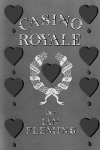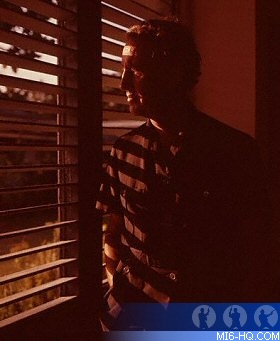 |
| |
MI6 reviews the haunting debut James Bond novel, "Casino Royale", published by Ian Fleming in 1953...
|
|
Casino Royale: Reviewed
19 August 2009
Introducing James Bond,
the secret agent with two kills on his hands. "Casino
Royale", Ian
Fleming's
first novel - published 13th April 1953 - is a short and
bitter introduction to the world of espionage from the
British author that would become an international household
name. Written from his Jamaican home, Goldeneye, Fleming's
fantastic agent journeys to Royale-les-eaux and does battle
with the repulsive SMERSH agent Le Chiffre at the card
table. Accompanied by some of the most capable allies of
all 13
novels, Bond's mission is far from the straight forwards
affair he takes it for.
This novel shows James Bond as a trusting and occasionally foolish British agent, but as the most capable card-player the Service has on offer, he has won this high-profile case to bankrupt Le Chiffre (The Number) and leave him for dead.
In many ways, "Casino Royale" is
a learning curve for both author and character. Whilst
Fleming experiments with his newfound love of fiction (having
been a factual reporter much of his working life) James
Bond is in the process of becoming the harsh and cautious
man we recall. He is somehow more trusting but less self-assured
when he deals with the emotional race Royale offers.
|
|

Above: First edition cover art by
Richard Chopping.
|
Save one flashback to the grey offices of MI6
in Regent's Park, London, the story is set entirely in Royale
- a fictional Côte d'Azur town, blessed with a high-rolling
casino to keep the tourist trade alive. The grand casino Fleming
describes in reality does not exist, but inspiration drawn from
his time in Navy Intelligence offices really does give the now-famed
author an insight into the world of espionage. Bond is joined
in Royale by: Mathis - a competent French liaison whom 007 has
reportedly worked with before; Felix Leiter - an American representative
of the CIA who is currently posted to Paris to liaise with NATO;
and Vesper Lynd of his own agency. Vesper, as secretary to
Head of S, has joined 007 on his mission much to his disgust
as he regards women as the kind of people who only disrupt
a good mission.
"But surely it is
Monsieur Bond?' Mathis's voice behind him was full of surprised
delight. Bond, appropriately flustered, rose to his feet.
'Can it be that you are alone? Are you awaiting someone?
May I present my colleague, Mademoiselle Lynd?'"

|
|
Bond - perhaps unwisely
- allows Vesper to become his 'right hand man' and
when the mission is deemed a success hopes to bed the tall,
dark and mysterious assistant. Much of the action takes
place at the high-stakes card table, where the game is
Baccarat (or Chemin de fer, they are one and the same).
The choice of the game is left to Le Chiffre, the villain
of the piece, attempting to recoup lost Soviet Union funds
at the gambling tables or face death by SMERSH assassination.
The object of the game is to earn a score closest to nine
(picture cards count for naught and any score over ten
counts only for the final digit) with two cards and an
option for a third. To play the
game, a gambler must meet
the banker's bet with a call of "Banco".
Le Chiffre is the host of the high-stakes table and the
banker. Fleming explains all of this with a true passion
for the odds but almost a sickening disgust for gambling
on the whole. As if a vice of the rich man, gambling is
something to be understood, undertaken but never enjoyed. |
About two thirds of the way through, the tempo
of this first Bond novel changes. Bond realises the fool he has
been to allow Vesper a part in the operation and finds that she
is his Achilles heel - he does not yet know how pertinent that
will be. A brutal torture scene ensues, where the true villainy
of Le Chiffre comes to light. Prior to this event the character
of the desperate gambler is flat and silent but when given the
upper hand - mainly having Bond tied naked to a chair ready to
be tortured - this character comes to life. His sick, twisted,
outlook on life and his desperate need to recover his lost funds
make Le Chiffre a truly evil opponent. When Bond is saved
by the uncharacteristic mercy of a SMERSH agent the book takes
its second of two gigantic turns.
007 is now left to his
own devices, after his recovery from brutal torture of
course, to pursue the lovely but oddly distracted Vesper.
For several chapters of this novel, Fleming spends the
time developing the character of James Bond, allowing his
rough and ready secret agent to fall in love and desire
to marry the girl from Section S.
"'I've got the corpses of a Japanese cipher expert in New York and a Norwegian double agent in Stockholm to thank for being a Double O. Probably quite decent people. They just got caught up in the gale of the world...'"
For its short length, this novel packs in
a lot of mystery, detail, intrigue and emotion. In many ways "Casino
Royale" explains to the world how James Bond hardens;
how he grows up to become the man we remember from the Fleming
canon. The ending is ultimately bittersweet, but by
the final page, the final line even, the character we come
to
accept and remember James Bond as is complete. Just when
you think you've paged nervously through the climax
of this novel, "Casino Royale" throws another punch. |
|

Above: 2008 artwork for "Casino Royale" by graphic artist Michael Gillette...
|
MI6 Rating

Capsule Reviews
A superb gambling scene, a torture scene which still haunts me, and, of course, a beautiful girl
- Raymond Chandler
The first part of the book is a brilliant novelette in itself, dealing with the unlikely but imaginative plot to ruin a Communist agent by gambling against him for high stakes... But then he decides to pad out the book to novel length and leads the weary reader through a set of tough clichés to an ending which surprises no one save operative 007.
- New York Times
Casino Royale has action, suspense, even romance - yes, Bond falls for that "bloody woman" - but most interesting and valuable, it provides a fascinating glimpse into a world long gone. It was a mostly Anglophile world, although you might spot the odd Yank, like Bond's CIA agent friend Felix Leiter, of whom "Bond reflected that good Americans were fine people and that most of them seemed to come from Texas.
- April Chase
Don't miss this. A sort of Peter Cheyney de
luxe, with everything of the very best and most expensive.
- The Observer (Maurice Richardson)
Related Articles
 Casino Royale Coverage
Casino Royale Coverage
 Ian Fleming Centenary
Ian Fleming Centenary